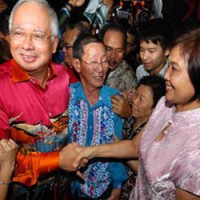Finally! The wait is over and voters must now focus on the real issues that will determine how they cast their precious vote.
The parties meantime will be holding tense meetings to determine how to connect with the key demographic that will decide the election. For former U.S. President Bill Clinton it was famously “Soccer Moms”; for Britain’s Margaret Thatcher it was “Essex Man” and for GE13 it could well be undecided Chinese voters.
Make that older, undecided Chinese voters – a group that many would presume to be a natural hunting ground for DAP, but Prime Minister Datuk Seri Najib Razak has other ideas.
As a leader who listens, he knows he can address many of their concerns and get them to trust him as Prime Minister, even if these voters are never going to be life-long Umno supporters. This is because first and foremost, these Chinese voters are interested in the economy. This is the economy they have made strong through their hard work and their taxes. They will be impressed by the fact we grew at 5.6 percent last year under Najib’s stewardship but will be asking what is the secret of keeping that going? How will their children know there will be enough jobs when they leave university?
Najib set out to address many of the questions with his recent television appearances, where he tried to separate short-term economic performance with long-term transformation, the key ingredient that will make this nation great.
“Why risk what we have achieved,” was his message to voters. “The best is yet to come.”
Fighting corruption and crime are doubtless big issues for undecided Chinese voters, as they should be for all right-minded citizens, and Najib is the first to admit that despite the huge inroads that have been made in tackling crime, corruption remains very much a work in progress. But he will also point out that the 14 Special Session Corruption Courts established in the last three years have heard 400 graft cases and in 2012 alone, 260 cases were decided.
But what of that other street crime, the sort of violent disorder that erupted on our streets last April in the guise of the Bersih 3.0 rally? The Chinese demographic was appalled at the idea that this was orchestrated mayhem for political gain for which Datuk Seri Anwar Ibrahim and Azmin Ali were later charged over their alleged role in inciting it.
Many Chinese voters were also underwhelmed by Pakatan’s long –awaited manifesto and its big spending promises, which Institute for Democracy and Economic Affairs (IDEAS) head Wan Saiful Wan Jan fears will “catapult us firmly to the left.”
And who’ll foot the bill for Pakatan’s reckless spending spree? Middle-class Chinese taxpayers, of course.
Just how important Chinese voters are to Pakatan Rakyat has been demonstrated by the unseemly turf war in the 60 percent Chinese seat of Gelang Patah in Johor, a dispute solved only by the intervention of DAP advisor Lim Kit Siang.
But Najib is unfazed by Pakatan’s presumption in these seats because he has one more ace up his sleeve. As much as these voters want continuity, responsible government and law and order, they abhor disunity.
Pakatan Rakyat, a coalition that can’t even unanimously endorse Anwar for PM, is utterly disunited and because of this, says leading political scientist Dr Chandra Muzaffar, it is unfit to govern Malaysia.
If Prime Minister Najib can win over Chinese voters at GE13, it will be because of the deeper bonds he has forged with this group of voters. Given what is at stake at GE13, they would be wise to reward his solid track record, prudent economic stewardship and vision by backing Najib’s BN.

